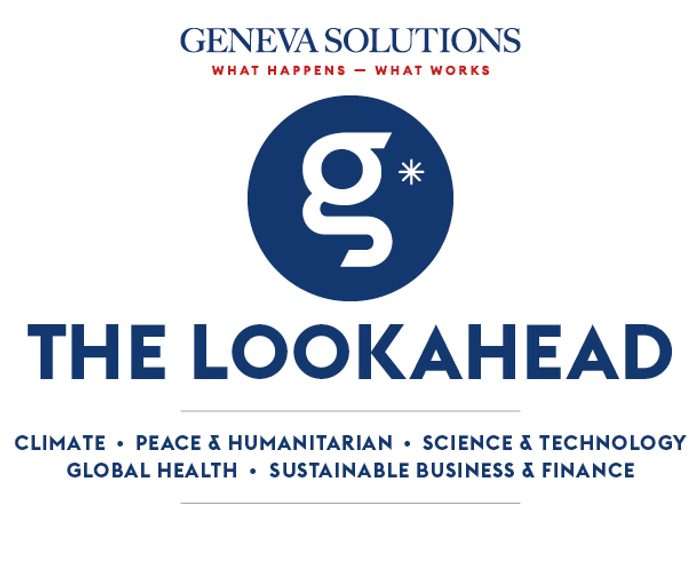Hello, this is Kasmira. This week marks the beginning of Pride Month. But for many who work in Geneva's humanitarian sector, the familiar signs of solidarity are largely absent from this year’s event calendars, and this uncomfortable silence speaks volumes, as Jamie Munn, the director of a large Geneva NGO network notes in today's opinion piece.
And the International Labour Organization's annual decision-making conference kicks off this week with nearly 5,000 people from the world of work due to gather in Geneva. But an uncertain backdrop amid funding shortages is casting a shadow over the event. |

|

People participate in the Pride March LGBTQ + Pride in Geneva, Switzerland, Saturday, 6 July, 2019. (Keystone/Martial Trezzini)
|
|
❝Quiet cuts and loud silences: this year’s Pride carries a heavier weight.
US president Donald Trump’s assault on diversity initiatives has had a silencing effect on many of Geneva’s humanitarian organisations, writes Jamie Munn, the director of the International Council for Voluntary Agencies (ICVA), a Geneva-based network of over 160 NGOs. Drawing from personal experience, Munn notes that the shift is particularly perceptible for gay people who often contend with quieter forms of bias, making it all the more important to sustain inclusive spaces within humanitarian institutions.
Geneva Solutions (EN)
|
|
|
💼WORK IT.
Less than a week after delegates attending the World Health Assembly emptied out of the Palais des Nations and headed home, a new cohort of nearly 5,000 people will arrive to take their place – this time to discuss the world of work.
The 113th International Labour Conference, the UN labour agency’s highest decision-making body, will bring governments, employers, and workers' representatives together from 2 to 13 June for its annual meet-up. And there’s plenty on the agenda – from first-time discussions on setting new norms for decent work in the platform economy to finalising a new convention that emerged after Covid to address biological hazards in the workplace.
|
|
Elephant in the room.
Overshadowing the conference is a big cloud of uncertainty over what the future of the UN and its agencies will look like as they grapple with a dramatic withdrawal in aid by the Trump administration and by other governments. ILO boss Gilbert Houngbo, confirmed to journalists last week that over 200 people have been laid off at its Geneva headquarters and in the field as a result of cuts to US-funded projects. Though a fraction of the job losses compared with those at the UNHCR and other agencies, Houngo said that for an organisation of 3,500 people it represented significant losses. "One job loss is too many ... You would not imagine the mood that has created among my staff," Houngbo said.
|
|
Relocation.
The job cuts, however, are only the beginning of the expected upheaval, as wider UN80 reform plans spell more changes ahead that could also involve relocating the staff out of Geneva to other cities to ease costs. Potential locations being considered include Turin, Budapest, or Bonn, or further afield to Doha or Praetoria, Houngbo said. A platform has been set up so that staff can submit ideas for making the agency more efficient. “We are in a turbulent time but we also see it as an opportunity to reset,” he said, adding that it will also be reviewing its senior management.
|
|
Budget approval.
One of the key items on the agenda will be adopting its $883m budget for 2026-2027. While virtually unchanged from last year, the global backdrop has undeniably shifted. The United States, its largest donor, contributes 22 per cent. But with Washington’s own budget for next year still not disclosed yet, the ILO, other UN agencies and other multilateral bodies could face the real prospect of seeing further dramatic cuts to US funding. Notoriously late in paying, Houngbo confirmed that the United States had still not paid all its dues for the 2024-2025 budget.
|
|
DEI stand-off.
One area already causing concern and which nearly derailed the approval of the ILO’s budget two years ago is resistance from some members over gender and diversity language relating to its policy on discrimination. Now there's likely to be renewed opposition – this time from the United States. “It’s not a matter of whether or not we should fight discrimination – it’s whether or not it should be used in our documents," Houngbo said, noting that the ILO hoped to resolve this by proposing that wording be addressed separately as a policy agenda item at a meeting of its Governing Body later this year.
📚Read also: UN Geneva, the quiet battleground in Washington’s anti-DEI crusade
|
|
🌪️DISASTER PLANNING.
Experts in reducing disaster risks will be meeting at the CICG this week, to present examples of how best practices helped avert and minimise impacts.
Co-hosted by the UN Office for Disaster Risk Reduction (UNDRR) and Switzerland, the gathering takes place two-thirds of the way into the Sendai Framework, adopted in 2015, that provides a roadmap to countries to reduce disaster risk and build resilience by 2030.
|
|
Why it matters.
According to a UNDRR report, to be launched on Tuesday, the possibility of experiencing a risk is only rising. A person born in 1990 had a 63 per cent chance of experiencing a catastrophic flood, while children born this year will be at a 86 per cent risk of enduring such an event.
Over the past 20 years, the cost of disasters has doubled to $200 billion per year, while indirect costs put that cost at a staggering $2.3 trillion per year.
– By Kasmira Jefford and Paula Dupraz-Dobias
|
|
|
GS news is a new media project covering the world of international cooperation and development. Don’t hesitate to forward our newsletter!
Have a good day!
|

|
|
Avenue du Bouchet 2
1209 Genève
Suisse
|
|
|
|








